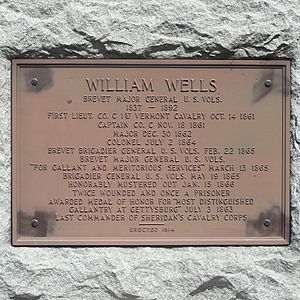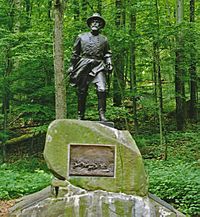William Wells (general) facts for kids
|
William Wells
|
|
|---|---|
Quick facts for kids 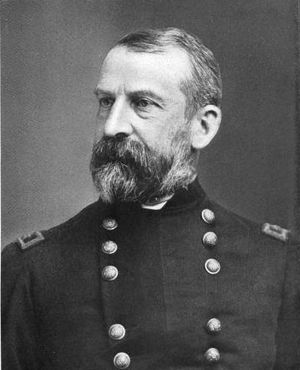
William Wells, Medal of Honor recipient
|
|
| Born | December 14, 1837 Waterbury, Vermont |
| Died | April 29, 1892 (aged 54) New York City, New York |
| Place of burial |
Lakeview Cemetery,
Burlington, Vermont |
| Allegiance | United States of America Union |
| Service/ |
United States Army Union Army Vermont National Guard |
| Years of service | 1861–1866 (Army) 1866–1872 (National Guard) |
| Rank | |
| Unit | 1st Vermont Cavalry |
| Battles/wars | American Civil War |
| Awards | Medal of Honor |
| Other work | Business, politics |
| Signature | |
William W. Wells, Jr. (born December 14, 1837 – died April 29, 1892) was an important person who was a businessman, a politician, and a general in the Union Army during the American Civil War. He was even awarded the Medal of Honor for his bravery during the famous Battle of Gettysburg.
Contents
William Wells's Early Life and Education
William Wells was born in Waterbury, Vermont. He was the third of ten children, and nine of them were boys! He went to local schools in his hometown. Later, he studied at Barre Academy and Kimball Union Academy in Meriden, New Hampshire.
When he was 17, William helped survey land for a map of Caledonia County. He used a special tool called an odometer for this job. Before the Civil War started in 1861, he worked with his father in their family business.
William Wells and the Civil War
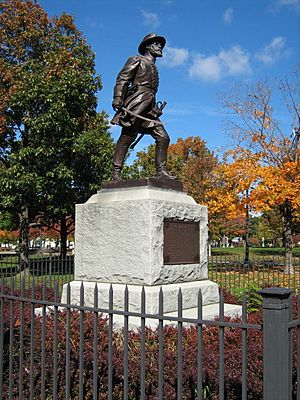
When the Civil War began, William Wells and three of his brothers joined the Union Army. William joined as a private soldier on September 9, 1861. He helped create Company C of the 1st Vermont Cavalry.
He officially joined the army on October 3, 1861. Soon after, he was promoted to first lieutenant and then to captain in November of that year. He was very active in battles, including one at Orange Court House, Virginia, on August 2, 1862. He was promoted to major on October 30, 1862.
| Big Round Top cavalry charge | |||||||
|---|---|---|---|---|---|---|---|
| Part of Battle of Gettysburg, third day cavalry battles | |||||||
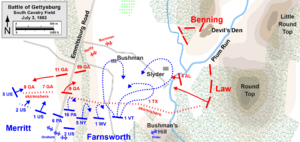 The Wells cavalry charge rode eastward across Plum Run and along a stone wall to where "the troopers reached the spur" of Big Round Top and turned north to pass to the rear of Law's Alabama regiments. The Confederates turned about and fired on the cavalry: "It was a swift, resistless charge, over rocks, through timber, under close enfilading fire." (Captain Henry C. Parsons) After "a struggle, the hill was carried by the 1st Vermont", and in 1891, Wells received the Medal of Honor "for leading the second battalion of [the 1st Vermont] regiment on a daring charge" at Gettysburg. |
|||||||
|
|||||||
| Belligerents | |||||||
| Commanders and leaders | |||||||
| Major William Wells | |||||||
| Strength | |||||||
| 2nd Battalion, 1st VT | 5 regiments of Law's Brigade | ||||||
| Following Wells' 1891 Medal of Honor for the charge, his statue was erected on the 1913 1st Vermont monument. | |||||||
Bravery at Gettysburg: Medal of Honor
Major Wells led the Second Battalion of the 1st Vermont Cavalry. They helped push back Stuart's Cavalry during the Battle of Hanover as part of the Gettysburg Campaign.
On the third day of the Battle of Gettysburg (July 3, 1863), Wells led a brave cavalry charge on Big Round Top. He rode right next to General Farnsworth, who was the brigade commander. Amazingly, Wells was not hurt, but General Farnsworth was killed among the enemy soldiers.
A few days later, Wells was wounded by a sword cut during a cavalry fight at the Battle of Boonsboro in Maryland. At Culpeper Court House, Virginia, on September 13, 1863, he led his regiment to attack enemy cannons and captured one. He was wounded again by a shell. Later, the United States Congress gave Wells the Medal of Honor for his "distinguished gallantry" (great bravery) at the Battle of Gettysburg.
Promotions and Key Battles
After a raid led by General Kilpatrick in March 1864, Major Wells was put in charge of the 7th Michigan Cavalry for a month. He also commanded a battalion of General Sheridan's cavalry at the Battle of Yellow Tavern, where Confederate General J.E.B. Stuart was killed.
Wells was promoted to colonel on June 4, 1864. From September 1864 to April 1865, he often commanded the Third Cavalry Division. In the Battle of Tom's Brook, Virginia (October 9, 1864), Wells led a brigade in General Custer's division. At the Battle of Cedar Creek, his brigade played a huge role in turning a morning defeat into a big victory by nightfall. They captured 45 of 48 cannons from the fleeing army of General Jubal Early.
Wells was made a brevet brigadier general of volunteers on February 22, 1865. This was an honorary rank. Generals Sheridan and Custer personally recommended him. He was then officially made a brigadier general on May 16, 1865. He also received another honorary rank, brevet major general, on March 30, 1865, for his "gallant and meritorious service."
William Wells received more promotions than any other officer from Vermont during the war. He went from a private soldier to a general in less than three and a half years! He served under famous generals like Kilpatrick, Sheridan, and Custer. He was with Kilpatrick during his famous raid on Richmond.
At Appomattox Court House, where the Confederate Army surrendered, Wells's brigade was about to charge. But General Custer himself stopped them because the war was ending. General Sheridan once said about Wells: "He is my ideal of a cavalry officer."
After the war ended, Generals Sheridan and Custer left for Texas. This made Wells the highest-ranking officer and the last commander of the Cavalry Corps of the Army of the Potomac. At the Grand Review in Washington, D.C. on May 22, 1865, he led the Second Brigade of Custer's Division.
William Wells took part in 70 cavalry battles. In 18 of these, he led a brigade or a division. He officially left the army on January 15, 1866.
Life After the War: Business and Public Service
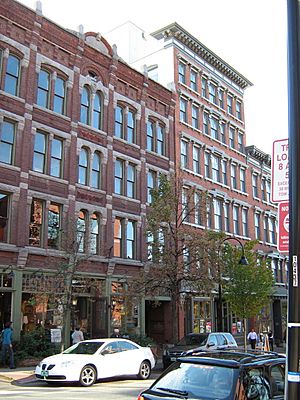
After the Civil War, General Wells became a partner in a company that sold medicines wholesale in Waterbury. In 1868, they moved their business to Burlington, which became his home.
In 1865-1866, he represented Waterbury in the state legislature. He was in charge of the military committee. In 1866, he was elected as the adjutant general of Vermont, a high military position in the state, and he held this job until 1872.
After that, he became the collector of customs for Vermont for 13 years. This meant he was in charge of collecting taxes on goods coming into the state. After this, he went back to his business, the Wells Richardson Company. This company was famous for making a product called Paine's Celery Compound.
General Wells was married and had two children: Frank Richardson and Bertha Richardson Wells. Bertha later married Dr. Horatio Nelson Jackson.
In 1886, Wells was a member of the Vermont State Senate for Chittenden County, Vermont. He was very active in groups for war veterans. He was a president of the Reunion Society of Vermont Officers and the Society of the First Vermont Cavalry. He was also a trustee and the first president of the Vermont Soldiers' Home. He was part of the Gettysburg Commission in 1889-1890.
General Wells was involved in many important businesses in Burlington. He was the president of the Burlington Trust Company, the Burlington Gas-Light Company, and the Burlington Board of Trade. He was also a director for the Burlington Cold Storage Company, the Rutland Railroad Company, and the Champlain Transportation Company.
He was a member of St. Paul's church and a trustee of the Young Men's Christian Association in Burlington. He was a very generous supporter of the YMCA. He was a person who helped his community in many important ways.
William Wells passed away suddenly from a heart condition called angina pectoris in New York City. He was still in the prime of his life. People remembered him as a kind and friendly man, a brave soldier, and one of Vermont's most respected citizens. Burlington businesses even closed down for his funeral. He is buried at Lakeview Cemetery in Burlington.
See also
- List of Medal of Honor recipients for the Battle of Gettysburg
- List of American Civil War Medal of Honor recipients: T–Z
- List of American Civil War generals (Union)
 | DeHart Hubbard |
 | Wilma Rudolph |
 | Jesse Owens |
 | Jackie Joyner-Kersee |
 | Major Taylor |


